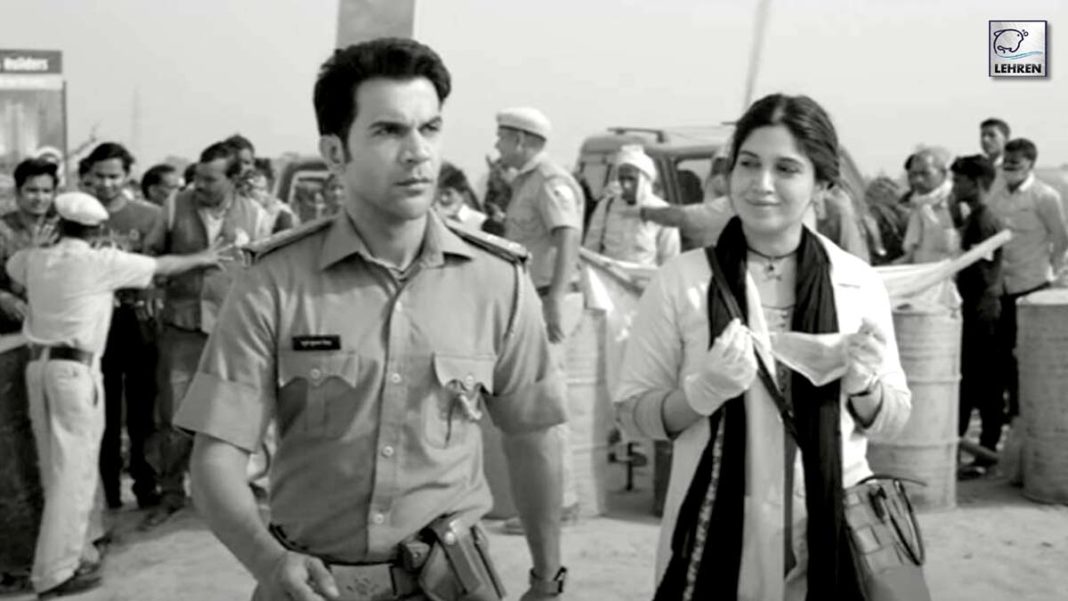Critics will call it a landmark film, fit for citations and trophies.
The audience will probably stay away.
Converted into stark black and white for effect, Anubhav Sinha’s mission to document the migration of jobless workers during the 2020 nationwide lockdown is more comprehensible and has more clarity than his last film Anek (2022). But it is less focused than his two engrossing films which successfully told the stories of prejudice against an Indian Muslim family (Mulk, 2018) and caste discriminations (Article 15, 2019). He slipped with Thappad (2020) when a relevant social comment got lost in unconvincing storytelling. Bheed has the same fault lines. It tries to tell too many stories, losing sight of what it set out to do, with all of Anubhav’s favourite ghosts combining to haunt him. Co-writers Sonali Jain and Saumya Tiwari may take the rap too, along with Sinha.
For example:
*Prejudice against Muslims that was the driver in Mulk enters the story of migrants as well when security guard Balram Trivedi (Pankaj Kapur), with a busload of families, would rather let kids cry with hunger than accept food packets from kind Muslims. He later goes begging for food from the same people he’d pushed away.
*The curse of caste that was the crux of Article 15 rears its head in bed when policeman Suryakumar Singh Tikkas (Rajkummar Rao) makes love to uppercaste girlfriend Renu Sarma (Bhumi Pednekar) who can’t get enough of him. Though her father won’t stand for a marriage between them. Caste trails Suryakumar outside too as the humiliations spilt over generations and from his childhood taunt him even on duty as chowki in charge at a state border. “We’re used to taking orders,” as he tells Renu at one point.
*The gender bias that was the premise of Thappad also seeps into the travails of the migrants as a young girl battles odds and peddles her alcoholic father to safety with the driver of a jeep commenting, “Look at that… and they say, girls are a bojh (burden).”
Anubhav’s pet angers and thoughts are put together with a class divide (Dia Mirza, privileged owner of a chauffeur-driven Fortuner, en route to fetch her daughter from boarding school) and the ubiquitous TV news team (Kritika Kamra as a primetime anchor) that wants headlines.
Clearly, Anubhav wants to tell many stories. Perhaps he should try telling them one at a time, not all of them together. The confusion in the director’s head also results in sequences like an understanding between Suryakumar and Trivedi in a mall that ultimately doesn’t yield what Trivedi had set out for – to get food for the hungry. There’s a shabbily done escape scene too where the cops could’ve easily overpowered Trivedi when he was on the motorbike but don’t. Also, for a grim lockdown story told at the height of the pandemic, masks and sanitisers are mentioned more than they are used by anybody, not even the cops.
When he doesn’t get waylaid by the many threads of thought running in his head, Anubhav Sinha brings the starkness of the mass migration that saw some heartachingly mowed down by trains or dying before reaching their destination. But it’s not his closeups of the dead, the buzz of flies around bodies or shots of calloused feet that are effective. It is the heartrending statistics in the end credits.
A main worry is that the plight of the migrant is not an unknown human sorrow that must be visually documented. Madhur Bhandarkar’s Lockdown India had Prateik Babbar and Sai Tamhane play migrant workers during the lockdown and their story was as bleak and stark as the migration was. Unpaused, an Amazon anthology, had stories on the lockdown with Abhishek Banerjee as a migrant worker. So Anubhav has not picked a story never told before.
Timed to coincide with the nationwide lockdown that was imposed on 23 March 2020, there has been much cribbing over the compromises that Anubhav had to make to get clearance from the Censor Board.
However, neither the extended lovemaking and abuses, nor the Prime Minister’s voiceover, or the references to the Tablighi Jamat (which would have been another extension of the prejudice against Muslims) or indeed the parallel drawn to the bloody communal Partition of 1947, are really missed.
Watch Bheed Trailer:
Also Read: Review | Rocket Boys Season 2 – A Tribute To Legends & Legacies

